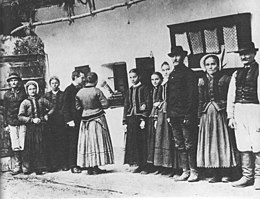Folk musicians
| Folk music | |
|---|---|

Béla Bartók recording Slovak peasant singers in 1908
|
|
| Traditions | List of folk music traditions |
| Musicians | List of folk musicians |
| Instruments | Folk instruments |
| Other topics | |
| Traditional folk music | |
|---|---|
| Stylistic origins | Traditional music |
| Cultural origins | Individual nations or regions |
| Typical instruments | See Folk instruments |
| Derivative forms | |
|
(complete list) |
|
| Fusion genres | |
| Other topics | |
| Roots revival | |
Folk music includes both traditional music and the genre that evolved from it during the 20th century folk revival. The term originated in the 19th century, but is often applied to music older than that. Some types of folk music are also called world music. Traditional folk music has been defined in several ways: as music transmitted orally, music with unknown composers, or music performed by custom over a long period of time. It has been contrasted with commercial and classical styles.
Starting in the mid-20th century, a new form of popular folk music evolved from traditional folk music. This process and period is called the (second) folk revival and reached a zenith in the 1960s. This form of music is sometimes called contemporary folk music or folk revival music to distinguish it from earlier folk forms. Smaller, similar revivals have occurred elsewhere in the world at other times, but the term folk music has typically not been applied to the new music created during those revivals. This type of folk music also includes fusion genres such as folk rock, folk metal, electric folk, and others. While contemporary folk music is a genre generally distinct from traditional folk music, in English it shares the same name, and it often shares the same performers and venues as traditional folk music.
A consistent definition of traditional folk music is elusive. The terms folk music, folk song, and folk dance are comparatively recent expressions. They are extensions of the term folklore, which was coined in 1846 by the English antiquarian William Thoms to describe "the traditions, customs, and superstitions of the uncultured classes." The term further derives from the German expression Volk, in the sense of "the people as a whole" as applied to popular and national music by Johann Gottfried Herder and the German Romantics over half a century earlier. Traditional folk music also includes most indigenous music.
...
Wikipedia
